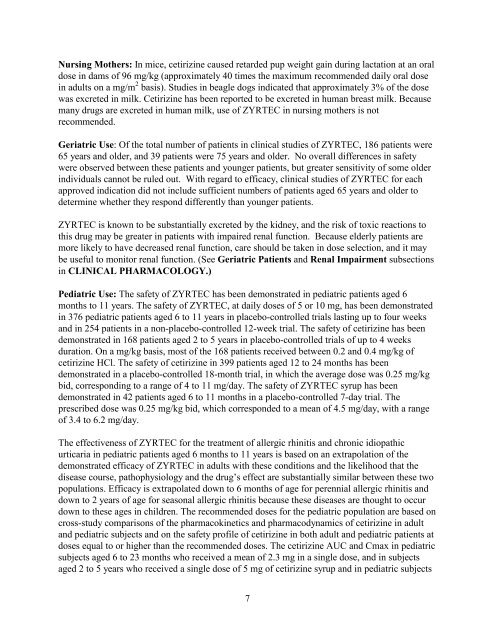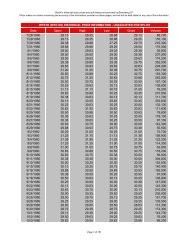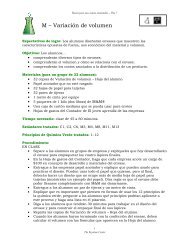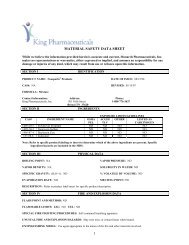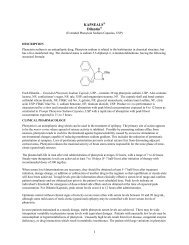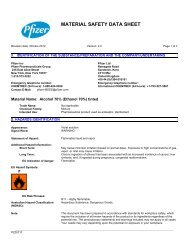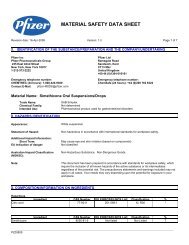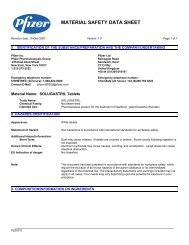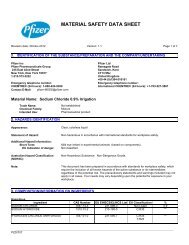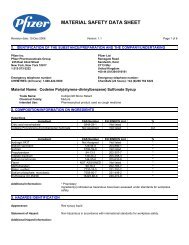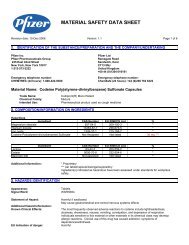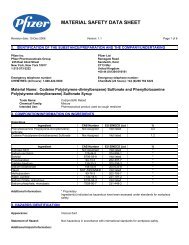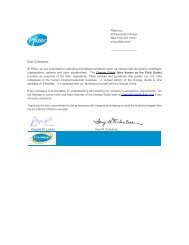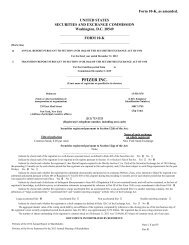ZYRTEC® (cetirizine Hydrochloride) Tablets, Chewable ... - Pfizer
ZYRTEC® (cetirizine Hydrochloride) Tablets, Chewable ... - Pfizer
ZYRTEC® (cetirizine Hydrochloride) Tablets, Chewable ... - Pfizer
Create successful ePaper yourself
Turn your PDF publications into a flip-book with our unique Google optimized e-Paper software.
Nursing Mothers: In mice, <strong>cetirizine</strong> caused retarded pup weight gain during lactation at an oral<br />
dose in dams of 96 mg/kg (approximately 40 times the maximum recommended daily oral dose<br />
in adults on a mg/m 2 basis). Studies in beagle dogs indicated that approximately 3% of the dose<br />
was excreted in milk. Cetirizine has been reported to be excreted in human breast milk. Because<br />
many drugs are excreted in human milk, use of ZYRTEC in nursing mothers is not<br />
recommended.<br />
Geriatric Use: Of the total number of patients in clinical studies of ZYRTEC, 186 patients were<br />
65 years and older, and 39 patients were 75 years and older. No overall differences in safety<br />
were observed between these patients and younger patients, but greater sensitivity of some older<br />
individuals cannot be ruled out. With regard to efficacy, clinical studies of ZYRTEC for each<br />
approved indication did not include sufficient numbers of patients aged 65 years and older to<br />
determine whether they respond differently than younger patients.<br />
ZYRTEC is known to be substantially excreted by the kidney, and the risk of toxic reactions to<br />
this drug may be greater in patients with impaired renal function. Because elderly patients are<br />
more likely to have decreased renal function, care should be taken in dose selection, and it may<br />
be useful to monitor renal function. (See Geriatric Patients and Renal Impairment subsections<br />
in CLINICAL PHARMACOLOGY.)<br />
Pediatric Use: The safety of ZYRTEC has been demonstrated in pediatric patients aged 6<br />
months to 11 years. The safety of ZYRTEC, at daily doses of 5 or 10 mg, has been demonstrated<br />
in 376 pediatric patients aged 6 to 11 years in placebo-controlled trials lasting up to four weeks<br />
and in 254 patients in a non-placebo-controlled 12-week trial. The safety of <strong>cetirizine</strong> has been<br />
demonstrated in 168 patients aged 2 to 5 years in placebo-controlled trials of up to 4 weeks<br />
duration. On a mg/kg basis, most of the 168 patients received between 0.2 and 0.4 mg/kg of<br />
<strong>cetirizine</strong> HCl. The safety of <strong>cetirizine</strong> in 399 patients aged 12 to 24 months has been<br />
demonstrated in a placebo-controlled 18-month trial, in which the average dose was 0.25 mg/kg<br />
bid, corresponding to a range of 4 to 11 mg/day. The safety of ZYRTEC syrup has been<br />
demonstrated in 42 patients aged 6 to 11 months in a placebo-controlled 7-day trial. The<br />
prescribed dose was 0.25 mg/kg bid, which corresponded to a mean of 4.5 mg/day, with a range<br />
of 3.4 to 6.2 mg/day.<br />
The effectiveness of ZYRTEC for the treatment of allergic rhinitis and chronic idiopathic<br />
urticaria in pediatric patients aged 6 months to 11 years is based on an extrapolation of the<br />
demonstrated efficacy of ZYRTEC in adults with these conditions and the likelihood that the<br />
disease course, pathophysiology and the drug’s effect are substantially similar between these two<br />
populations. Efficacy is extrapolated down to 6 months of age for perennial allergic rhinitis and<br />
down to 2 years of age for seasonal allergic rhinitis because these diseases are thought to occur<br />
down to these ages in children. The recommended doses for the pediatric population are based on<br />
cross-study comparisons of the pharmacokinetics and pharmacodynamics of <strong>cetirizine</strong> in adult<br />
and pediatric subjects and on the safety profile of <strong>cetirizine</strong> in both adult and pediatric patients at<br />
doses equal to or higher than the recommended doses. The <strong>cetirizine</strong> AUC and Cmax in pediatric<br />
subjects aged 6 to 23 months who received a mean of 2.3 mg in a single dose, and in subjects<br />
aged 2 to 5 years who received a single dose of 5 mg of <strong>cetirizine</strong> syrup and in pediatric subjects<br />
7


